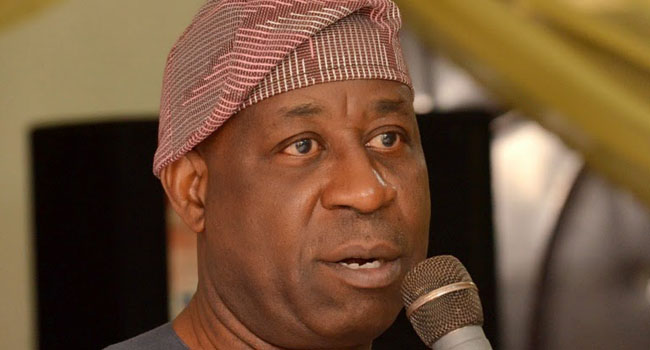Politics
ANALYSIS: Revisiting Tinubu’s new mining sector policy

The Minister of Mining and Solid Minerals, Mr. Dele Alake, on Monday, September 4, unveiled the Transformation Agenda for the sector as part of the plan to position it for competitiveness.
Alake highlighted the policies and direction of the ministry, which can be summarized into the following:-
• Creation of the Nigerian Solid Minerals Corporation
• Joint Ventures with Mining Multinationals
• Big Data on specific seven priority minerals and their deposits
• 30-day grace for illegal miners to join artisanal cooperatives
• Mines Surveillance Task Force and Mine Police, Comprehensive review of all mining licenses and
• The creation of six (6) Mineral Processing Centres to focus on Value-Added products.
The World Bank estimates Nigeria’s mining sector to be worth $700 billion- $1 trillion. This is solely based on the 40 precious stones/minerals abundant in Nigeria.
Now the mining ministry has decided to pay attention to few of those precious stones for now. They include gold, manganese, bitumen, lithium, iron ore, lead, zinc, limestone, uranium, columbite, barite, kaolin, gemstones, coal, topaz and copper.
Amongst the above, the government is going to prioritize only seven minerals, namely Gold, Coal, Limestone, Bitumen, Lead, Iron-ore and Baryte.
These 7 priority minerals were picked because:
1) they are pretty low hanging, as the country has had some prior investment in them.
2) in line with the direction of Mr President, they are the minerals to support his ideas and plans for the economy.
READ ALSO:Taraba govt bans mining activities
Alake, during the press conference pointed out that mining was big business and Nigeria must assert its presence in the environment by replicating its strategic positioning in the petroleum sector by setting up a corporate body that plays in this field.
His words: “Consequently, the Ministry shall work towards the incorporation of the Nigerian Solid Minerals Corporation. This is a corporate body that will have subsidiaries doing business in the seven priority areas that require immediate intervention and focus: Gold, Coal, Limestone, Bitumen, Lead, Iron-ore and Baryte.
“Existing enterprises, such as the National Iron-Ore Company, and ongoing arrangements, such as the Bitumen Concessioning Programme, will be reviewed to fit into this new system.”
How can this initiative reposition the Nigerian Economy
President Bola Tinubu has been very vocal about manufacturing steel. No great country has emerged without steel production. Steel production and the value added chain is very critical, if indeed Nigeria is serious about industrialization.
That is also while prioritizing coal, iron ore production investment. Barite production will be helpful in a lot of industry but most especially oil and gas, to which Nigeria remains a leader.
Gold is also prioritized because the value addition to gold without regards to jewelry making is enormous.
Bitumen and limestone are getting attention because of his plans for the construction sector (real estate and infrastructure).
Again, emphasis must be made that the idea is not just mining but adding value to the raw minerals mined. That is why six value processing centers will be established.
What will the Ministry for mining be doing?
Set up a corporation like NNPC to see to the operations of mining and exploration activities. It frees the burden on the mining ministry so they focus on policy and regulation.
The corporation to be set up will engage investors in a joint venture (with international miners just like NNPC) on the mining activities. So this means that the country isn’t just selling license to mine but for every ton of minerals mined and sold, it gets a percentage of Forex from the sale.
The corporation is also expected to help “Nigerian” business men interested in mining access funds both internationally and locally (banking sector).
Again it is important to domesticate investment through indigenization. It prevents capital flight and grows the economy better. In view of the above the government is ready to make sure Nigerians and only Nigerians get the full benefit of its mining sector
Finally, people might wonder why lithium is not prioritize: first off, Nigeria do Mrs not have complete data on lithium, so that is ongoing. The only place where lithium known to be in commercial quantity is Nassarawa.
Secondly, lithium and its value added chain is not consistent with the direction of Mr President with regards source of energy.
Nigeria still gets most Forex from crude oil and will want to continue to grow the sector. Mr President is also favoring gas as the next source for energy. Prioritizing lithium investment now may hinder that of gas.
In a nutshell, the country will witness massive industrialisation if these initiatives are successfully implemented.
Join the conversation
Support Ripples Nigeria, hold up solutions journalism
Balanced, fearless journalism driven by data comes at huge financial costs.
As a media platform, we hold leadership accountable and will not trade the right to press freedom and free speech for a piece of cake.
If you like what we do, and are ready to uphold solutions journalism, kindly donate to the Ripples Nigeria cause.
Your support would help to ensure that citizens and institutions continue to have free access to credible and reliable information for societal development.






















